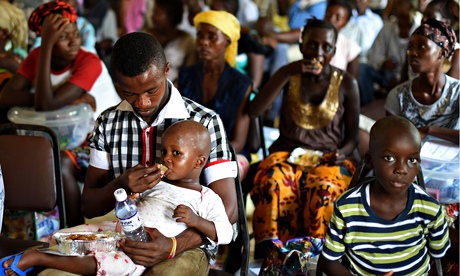 |
| A child who recovered from Ebola is fed by another survivor at Freetown’s Hastings centre, which has just discharged 63 survivors. Photo: Francisco Leong/AFP/Getty |
Doctors in Sierra Leone are to start their own clinical trial, using
the blood of Ebola survivors, to speed up the search for a cure for the
disease, which has so far killed more than 5,000 people in west Africa.
The trial, organised by a global group of Sierra Leonean medics, will take place in parallel with similar trials announced last week by Médecins Sans Frontières to be run in Guinea in December.
The Sierra Leone Action Group has some 200 survivors registered as possible donors, and hopes to start banking their blood plasma in mid-December after receiving equipment donated by a US medical devices firm. Scientists hope that the antibodies in the blood of people who have recovered from the disease will help other patients fight the infection.
One of the founders of the group, Ahmed Tejan-Sie, a clinical assistant professor at the University of North Carolina, said volunteer donors would be screened for HIV, hepatitis and syphilis and other diseases that would exclude them from the trial.
“Once we have completed the screening we hope to generate between 70 to 80 patients for the first trial,” said Tejan-Sie. “That will be a sufficient sample size for us to detect whether there is any beneficial effect 14 days after treatment.” .
The equipment will be able to draw 18,000 units of convalescent serum from survivors over six months, said a spokesman for the US company that donated the instruments, Fresenius Kabi.
Dr Foday Sahr, who will lead the trial, said it would take place at the Hastings Ebola treatment centre, near Freetown, where all patients receive intravenous fluid and antibiotics within 24 hours of admission.
It is hoped that using blood plasma to treat patients, known as convalescent serum therapy, will help patients kickstart the generation of their own antibodies and help them fight off the Ebola virus, which can kill within five days.
Will Pooley, a British nurse who survived Ebola, donated plasma to an American doctor who became infected in west Africa. The doctor, who has not been named, survived the disease but there is no way of proving that Pooley’s plasma led to the doctor’s recovery.
Sahr said he believed the “science was good” and that the trial would help break the chain of infection in his country.
The trial, organised by a global group of Sierra Leonean medics, will take place in parallel with similar trials announced last week by Médecins Sans Frontières to be run in Guinea in December.
The Sierra Leone Action Group has some 200 survivors registered as possible donors, and hopes to start banking their blood plasma in mid-December after receiving equipment donated by a US medical devices firm. Scientists hope that the antibodies in the blood of people who have recovered from the disease will help other patients fight the infection.
One of the founders of the group, Ahmed Tejan-Sie, a clinical assistant professor at the University of North Carolina, said volunteer donors would be screened for HIV, hepatitis and syphilis and other diseases that would exclude them from the trial.
“Once we have completed the screening we hope to generate between 70 to 80 patients for the first trial,” said Tejan-Sie. “That will be a sufficient sample size for us to detect whether there is any beneficial effect 14 days after treatment.” .
The equipment will be able to draw 18,000 units of convalescent serum from survivors over six months, said a spokesman for the US company that donated the instruments, Fresenius Kabi.
Dr Foday Sahr, who will lead the trial, said it would take place at the Hastings Ebola treatment centre, near Freetown, where all patients receive intravenous fluid and antibiotics within 24 hours of admission.
It is hoped that using blood plasma to treat patients, known as convalescent serum therapy, will help patients kickstart the generation of their own antibodies and help them fight off the Ebola virus, which can kill within five days.
Will Pooley, a British nurse who survived Ebola, donated plasma to an American doctor who became infected in west Africa. The doctor, who has not been named, survived the disease but there is no way of proving that Pooley’s plasma led to the doctor’s recovery.
Sahr said he believed the “science was good” and that the trial would help break the chain of infection in his country.










0 comments:
Post a Comment